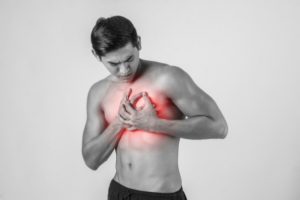Chest pain is not a heart problem
 If there is pain in the chest, then the first thing we suspect is heart pain. However, doctors say that about 25% of patients referring to them for alleged heart pain, suffer from completely different diseases. Indeed, in the chest is not only the heart muscle. Other organs can also signal a problem with chest pains.
If there is pain in the chest, then the first thing we suspect is heart pain. However, doctors say that about 25% of patients referring to them for alleged heart pain, suffer from completely different diseases. Indeed, in the chest is not only the heart muscle. Other organs can also signal a problem with chest pains.
Of course, for any pain you should visit the doctor. After all, since the body warns that it is not all right. However, heartache is most dangerous – heart pathologies may well end in tragedy.
That is why it is important to be able to distinguish heart pain from “extracardiac”.
Chest pain: “non-cardiac” causes
1. Irritation or inflammation of the intercostal nerves – intercostal neuralgia. This pain is often taken for the heart. This is a sharp or shooting pain, aggravated by any movements and tension of the chest, such as sneezing, coughing. Most often, osteochondrosis is manifested – degenerative-dystrophic changes in the spine.
2. Intercostal myalgia – damage to the pectoral muscles. It manifests itself as intercostal neuralgia. It occurs due to osteochondrosis, lung diseases.
3. Bone pain is similar to neurological and muscle pain. It is caused by injuries, tumors or inflammatory lesions in the bones.
With neuralgia of the chest, the heart may appear to hurt.
4. Diseases of the bronchi, lungs manifested by pain in the chest. Pain on the one hand, become stronger when the patient inhales deeply, moves. An additional symptom of pulmonary disease is cough.
5. Inflammation of the trachea causes a sore pain in the middle of the chest. Characterized by coughing.
6. Symptoms of esophageal diseases – tumors, diverticulum (protrusion), esophagitis, hiatal hernia – are also chest pains. They are localized below, in the middle and felt like a burning sensation. Complemented by belching, acid in the mouth, nausea. Pain syndrome is reduced, if you drink water, eat something.
Chest pain – from the heart
Symptom in the form of pain accompanies heart disease:
Coronary artery disease – ischemic heart disease;
myocardial infarction;
pericarditis;
rupture (separation) of the aorta in its chest;
Pulmonary embolism – pulmonary thromboembolism.
These are very difficult, often requiring immediate assistance or potentially dangerous conditions.
Ischemic heart disease
The main symptom of coronary artery disease is angina. Its distinguishing features are:
occurs behind the sternum or to the left, radiates (gives) to the neck, shoulder blade, arm;
by character – squeezes, crushes, burns;
comes with physical effort, emotional shock;
in peace itself passes;
cleaned with medication.
CHD can pass if you take a pill
When heart pain lasts more than half an hour, it speaks of a heart attack.
Myocardial infarction (MI)
It develops as a result of a blood supply disturbance. In this case, the pain increases. A painful attack is not relieved by medication.
Along with pain, shortness of breath occurs, it is difficult for the patient to breathe, sweat appears, nausea is possible, and a feeling of fear appears.
Pericarditis
Inflammation of the surrounding heart muscle shell. In acute pericarditis, the pain is similar to the sensations in myocardial infarction.
When a person coughs, breathes deeply, assumes a lying position, the pain becomes stronger. She weakens in a sitting posture, leaning over.
Aortic dissection
This is a life threatening condition. A rupture occurs in the aortic wall, and blood flows between its layers. If a dissection has occurred in the thoracic aorta, severe pain occurs behind the sternum. Sometimes it is so intense that the patient may faint.
TELA
By this term is meant a condition when a detached blood clot – a blood clot – clogs an artery or its branch, preventing blood flow.
A dry cough that doesn’t go away can cause heart disease.
In pulmonary embolism, pain resembles sensations in myocardial infarction or acute pleurisy.
Other symptoms include shortness of breath, cough (dry), sometimes hiccups, bloated belly.
Chest pain as symptoms of illness
Chest pain is a sign of many pathologies. However, each disease has a specific nature of pain.
1. The pain is unbearable. Irradiate to other parts of the body. Not removed by medication. Such pain is inherent in unstable IHD, MI.
2. The pain, which compresses, crushes, develops after movements, walking, other physical efforts, mental shock, and at rest disappears, is associated with CHD.
3. Chest pain that occurs when a person takes a deep breath, coughs, is a sign of pulmonary pathology (pleurisy), dystrophic changes of the spine, neuralgia and myalgia, injury to the ribs, PATE.
4. Intolerable, excruciating pain characterizes aortic rupture. The hallmark is increased pain when the patient raises his arms.
5. Chest pain with cough, shortness of breath, fever, severe weakness indicates inflammation of the lungs.
6. Pain with burning, rising to the throat, aggravated if the patient lies, is a sign of gastroesophageal reflux disease.
7. Pain that lasts for several days and depends on a change in posture indicates intercostal neuralgia.



